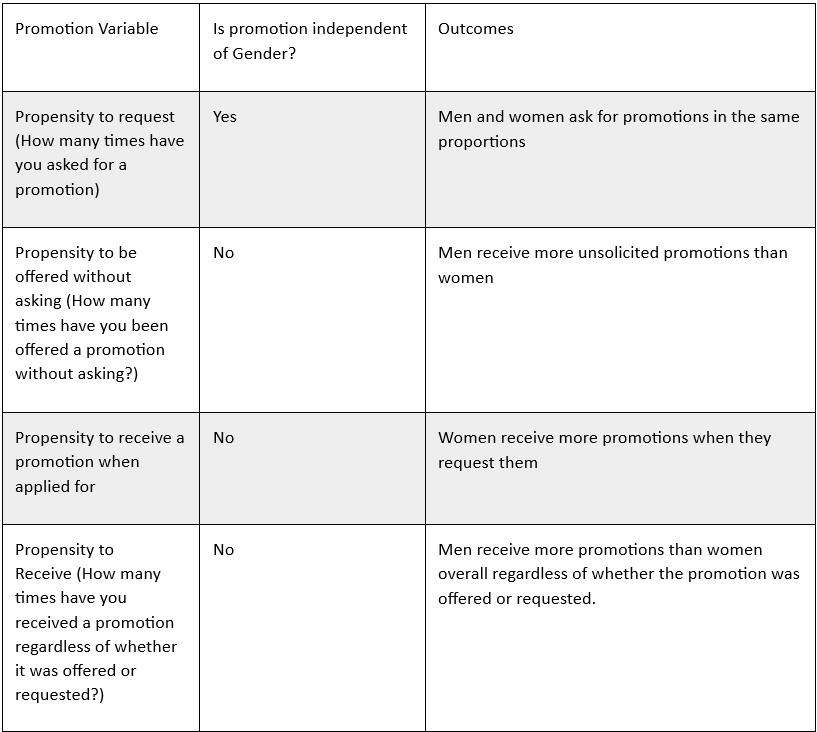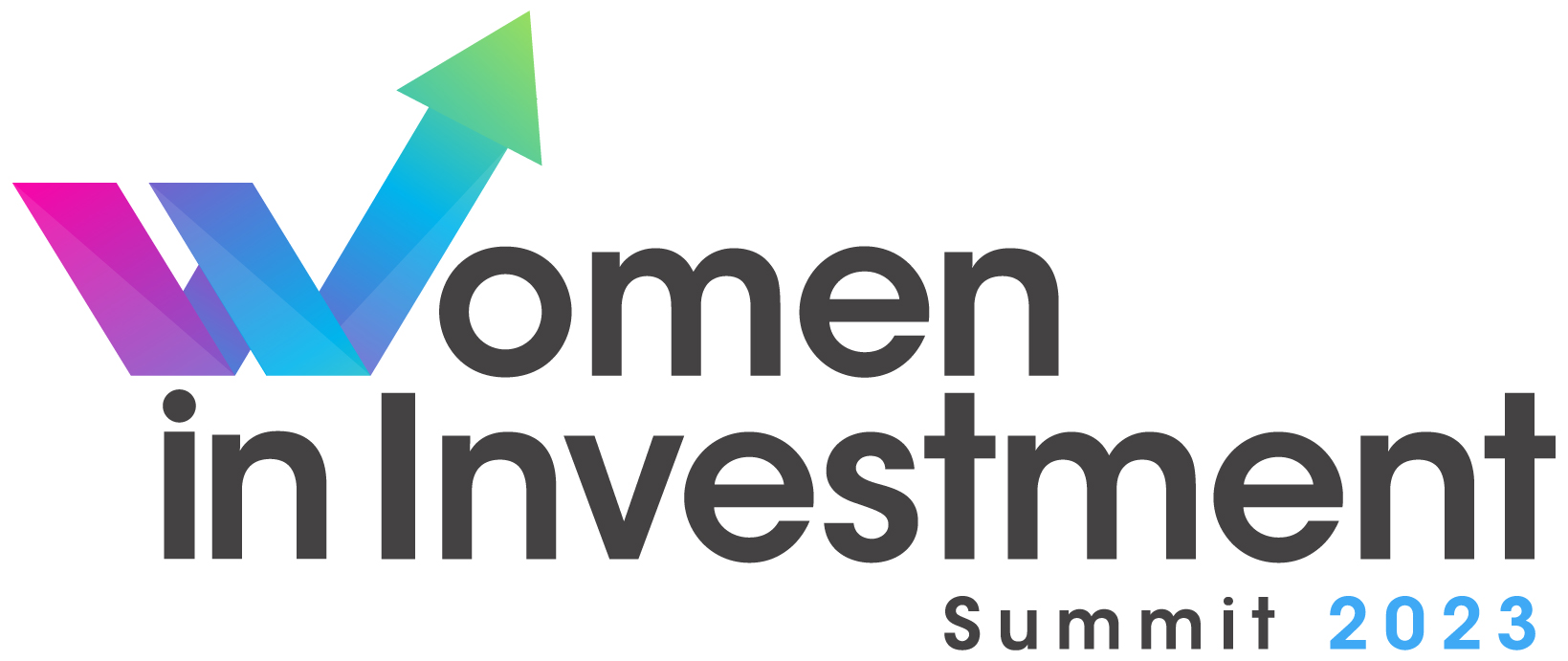At the Women in Investment Summit 2023, Laura Ryan, Head of Research, Ardea Investment Management will examine practical, real-world strategies to close the gender promotion gap for women in investment.
In the lead-up to the event, Laura has shared some of her insights on the subject based on her research in the area. Read on to learn more about:
- What are some key variables impacting whether someone receives a promotion in the financial services sector?
- Which of those variables are dependent on gender and what is the resulting impact on women in the profession?
- What strategies can women use to obtain promotions and improve their career progression?
GENDER IDENTITY AS AN IMPORTANT FACTOR IN THE LIKELIHOOD OF PROMOTION
Those identifying as female employed in financial services are substantially less likely to be offered an unsolicited promotion than those identifying as male. However, those identifying as female are more successful at receiving a promotion when they request it. The study, which aimed to test whether gender identity is a factor in promotion rates, found that gender plays a role in careers, and those identifying as female were less likely than their male counterparts to receive a promotion, regardless of whether they requested it or not. This research study was funded by a Gender Diversity Grant from the Australian National College of Business and Economics, as part of joint research partnership with the CFA Institute. The survey supporting the study was conducted in 2019 and the research was led by Dr Laura Ryan, Head of Research, Ardea Investment Management.
Full survey responses were received from over 400 people employed in the Australian financial services sector, 33.5% of whom identified as female.
The survey posed three questions relating to promotions, defined as a change of title to a rank higher than currently held:
- How many times have you asked for a promotion?
- How many times have you received a promotion?
- How many times have you been offered a promotion (without asking)?
The data was tested to determine whether the answers were independent of gender identity and controlled for education, years of experience, career breaks and job function.
The questions above allowed the researchers to test whether the four promotion variables in the table below were independent of gender.

Dr Ryan commented: “Our study confirms that males benefit from a bifurcated promotion process, in which ‘gifted advancement’ i.e. promotion without prior request of the employee, is a significant contributor to males receiving a compounded financial advantage over females as a direct result of the latter’s less frequent promotion”.
Cassandra Crowe, CFA (Vice President T. Rowe Price Group, Inc.), co-author, notes “This study is important to gaining an insight into the factors resulting in the under-representation of women in the top ranks of global financial services companies as reflected in data collected by CFA Institute, highlighting women represent approximately 11% of investment management Chief (Chief Executive Officer, Chief Investment Officer, Chief Financial Officer) positions globally and 14% across the Asia-Pacific region as at June 2023.”
Previous studies have put forward reasons for this discrepancy, which include: a lack of female talent, women are too agreeable and career breaks due to family commitments. However, these reasons ignore the possibility of systemic discrimination and bias, which our study explored.
While research has been devoted to cataloguing and detailing the difference in pay based on gender across numerous industries, this study focused on looking at a related and distinct feature of female professional attainment – promotion rates across the entire finance sector at all levels.
Earlier research conducted in the United States has identified structural bias in performance appraisals among retail employees where women receive substantially lower ratings for their potential as employees, despite receiving higher job performance ratings (Benson, et al., 2021, pp. 0, 1, 26)
The key insight that “despite being more likely to receive top performance ratings, women are less likely to be thought of as possessing high ‘potential’”, could provide one possible explanation for the results of our study.
The research questions the inequity created by such a bifurcated system within the Australian financial services sector and suggests that future research should be undertaken to examine the promotion gap as a result of these findings.
One of the subsets of data our study examined was the impact of career breaks (time out of their job for any reason for more than six months) on promotion. These breaks typically include maternity or paternity leave and time out for further education.
Survey responses showed close to half of women and over one third of men had taken time out of their career. The data indicated that a career break triggered an important behavioural change – men who have taken a career break are more likely to ask for a promotion than women who have taken a break.
Given that women are slightly more successful at being promoted if they request it, this changed propensity to ask can make a substantial difference to their career progression. This was identified in earlier research as the “motherhood penalty, fatherhood bonus” dichotomy (Budig, 2017) (Wei-hsin & Yuko, 2021).
Nonetheless, among those who have not taken a career break, it is clear that women are in fact leaning in to ask for promotions, contradicting the notion mentioned earlier that the pay and promotions gap is, in part, due to differing levels of “agreeableness” between men and women, a behaviour usually construed to mean women do not request or put themselves forward due to a desire to be “agreeable”.
By providing evidence that challenges this notion and instead points to the significance of ‘gifted advancement’ to the difference in promotion rates, the study offers an original contribution to existing literature on workplace promotion.
The study calls on the Australian finance industry to develop and adopt a standardised framework for the development of corporate promotion policies with the specific goal of mitigating the systemic bias in current promotion rates.
Sarah Maynard Global Senior Head, DEI CFA Institute shared “CFA Institute has developed a Diversity, Equity, and Inclusion Code for the investment industry which, through practical frameworks, aims to support firms as they develop their own processes to enable greater equity across financial services organizations. We are looking forward to working with investment leaders in Australia to explore how we can most helpfully adapt and offer the Code to this market.”
Join us at the Women in Investment Summit to hear from Laura Ryan and a host of other inspirational investment leaders from 12-14 September 2023. Learn more.
To access the detailed conference program, download the brochure here.
To access Laura’s full article and research paper, click here.

